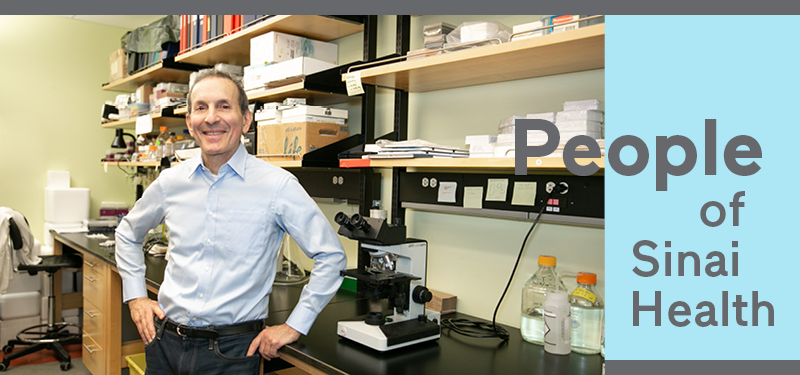
A recent recipient of the prestigious Manning Laureate Award, Daniel was recognized for his work in discovering a new class of drugs that help people with short bowel syndrome – a rare but challenging condition where the body cannot adequately absorb nutrition. While this is a departure from his early work in thyroid conditions and his continued research into new diabetes therapy and clinical care, Daniel shared what must be one of his mottos: “you have to go where the research takes you.”
We sat down to talk to Dr. Drucker about his early career, his current work, and what he’s doing when he is not studying cells and enzymes through a microscope.
Congratulations on receiving the Manning Laureate Award. Can you tell me a bit about what impact an award like this has on your work?
An award like this doesn’t directly advance the work, but the validation is important. The Manning Laureate Award is interesting because it is not just recognizing innovation in health care, or with scientific discovery, but it reflects the broad range of innovation across all sectors. The award is recognition for the bench to bedside development of a new drug therapy for short bowel syndrome. And that discovery is such a long road – it often takes about 15-20 years from initial testing to having something on the market, and it’s not always a linear progression. This work on a subset of rare intestinal disorders is a very different direction than I normally work in, but you never know where you will end up, and it’s important to be unbiased when you are working in scientific discovery. And it feels great to have this work recognized by a Canadian institution like the Manning Foundation.
How many years have you been at Mount Sinai, and what brought you here?
I have been at Mount Sinai for almost 13 years. I was attracted by the focus on diabetes at multiple levels, and the tremendous reputation of the Lunenfeld-Tanenbaum Research Institute.
How has your early career influenced where you are now?
My early career was built as a physician at the University of Toronto and I really loved seeing patients. It was so satisfying to make a difference for people. But it’s important not to be set on a single path. I thought I was temporarily taking a break from seeing patients when I took an opportunity to do research in Boston, and I thought I was furthering myself as a physician and researcher into thyroid conditions. But the research turned out to be, with the benefit of patience and hindsight, so amazing. When you are seeing patients, you can make a difference for one person at a time. When you are doing research, you can potentially help millions of people.
I really did think my research would fail initially. My parents are both Holocaust survivors and their struggle to survive and to give me opportunities has influenced me greatly, and made me work hard. I try and show up each day to do what I can to help other people in the ways I know how.
Is there anything you do differently for your own health as a result of your study? Anything you advise to your friends or family to maintain good health?
Not really. Good health is a combination of luck, genetics, a reasonable diet, exercise and trying to avoid less desirable harmful behaviours and stressful environments.
What do you do when you are not doing research?
I love to golf and I get out as much as I can during good weather, and I try to work out every day. It’s important to me to spend time with my family – my wife and sons and daughters-in-law, and my grandchildren, whether that is summers at the cottage or dinner together when we can. Today, my wife and I are heading out to the AGO before sabbath dinner.
New publication from the Drucker Laboratory In a new paper published in Cell Metabolism, senior author Daniel Drucker, along with Elodie Varin and colleagues in the Drucker lab, identified where and how a class of drugs called DPP-4 inhibitors controls glucose, as well as inflammation, which can accelerate the development of complications such as heart disease in diabetics. Dr. Varin demonstrated, using pharmacological studies and mouse genetics, that the cellular environment where the DPP-4 is produced may make a difference in how it acts; in particular that liver cells represent an important source of DPP-4 for control of inflammation, whereas bone marrow and blood vessels that contribute DPP-4 are critical for the control of blood glucose.
Unexpectedly, Dr. Varin found that DPP-4 inhibitors increase the levels of the DPP-4 enzyme while simultaneously lowering levels of blood sugar. The group is now extending their analysis to humans, to determine whether the levels of DPP-4 activity and protein are differentially regulated in some individuals with diabetes and heart disease.
“Understanding how and where drugs work is important for determining if some drugs work better in specific groups of individuals, relative to others,” said Dr. Drucker. “New therapies such as DPP-4 inhibitors are widely used to treat type 2 diabetes and, understanding how they work, and whether some individuals will have better responses to these drugs, represents an important avenue for future investigation.”
